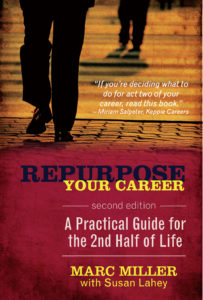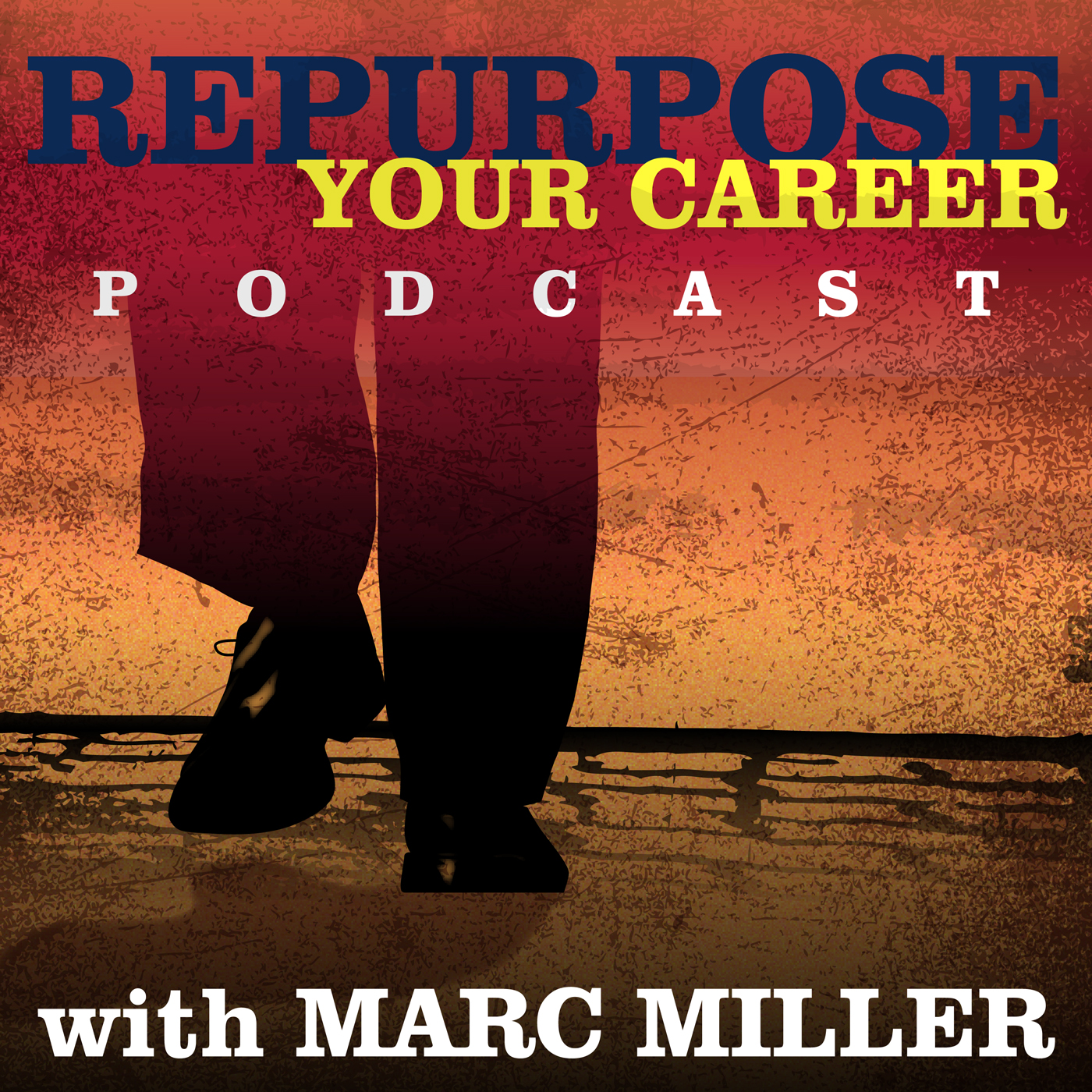The Dread Question – Why Do You Want to Leave? Chapter from Repurpose Your Career – A Practical Guide for the 2nd Half of Life
 It is all but guaranteed that somewhere in the interview process you will be asked the following question:
It is all but guaranteed that somewhere in the interview process you will be asked the following question:
“Why do you want to leave your current position?”
Prepare an answer, of course, but also prepare for the interviewer to keep harping on the question in one form or another to see if you will start spilling angry beans. Have a strategy against taking the bait. Your response should pivot the conversation from what you are leaving to where you are going! It is all about reframing the question.
So you might respond:
“I am happy in my current position*, but I am looking for (something this new job provides).
*Whether this is true or not
Do not get negative! If anything you says sounds, smells or tastes negative, stop, regroup and start again with a positive tone.
Remember when we talked about running to something, and not running from something?
WHEN YOU NEED MORE LOVE AND MORE MONEY
Let’s use Robert as an example.
He’s a political science lecturer at a major university in the Midwest. He had been an energy lobbyist until the 9/11 disaster and the Enron bankruptcy put him out of work.
Listen to the most recent episode


Marc Miller
Discover the Perfect Destination for Your Retirement or Remote Work Abroad #337
He went back to school to get his master’s degree in political science and landed a lecturer position at the university he had attended. His pay is very low. He has been teaching the same classes for many years, and his ego has taken a bruising.
He is the kind of guy who really likes a pat on the back from his bosses, which he does not receive. He gets appreciation from his students, but not from anyone else at the school.
The tedium of teaching the same classes has gotten to him. He has realized he needs a lot of variety to keep him motivated.
He needs to make more money. He is married with two kids, and the money is not sufficient. He is not on a tenure track, so this is somewhat of a dead-end job.
He wants a position as an energy lobbyist.
How could Robert respond when posed with the magic question on why he is leaving? One possible response could be:
“I love my job and my students, but what I really want is a position where I can get some recognition for my work, where I get to work on a wide variety of topics and I can make enough money to support my family.”
Let’s say the interview comes back with this: “Do you not get that from your current position?”
Robert could respond:
“My salary is public record and you can look that up. I am focused on where I want to go, and your position seems to meet my criteria. Can I ask you about the variety of topics I would be working on at this position?”
He can pivot the response to where he is going and, when questioned, use it as a way to pose a question back to the interviewer.
benefits. He has been climbing the corporate ladder with a plan to be a VP. He is not happy in his current position working for a huge, slow-moving organization.
He has worked for medium-size companies where he has had a leadership role in HR.
His boss Steve, VP of HR, whom James just adored, left because Steve’s boss was a workaholic and expected all of his staff to be the same way.
After much thought, James has decided he would rather work for a smaller company again. He wants to be a big fish in small pond.
He has applied and is interviewing for Steve’s old VP position but cannot see himself working for the workaholic boss. If offered the job, he will be put in a very difficult position because he has a family and wants a personal life.
He is also interviewing to become director of HR for a small/medium size company that is growing rapidly. He would have a small staff but would be responsible for the HR for the entire company.
When he interviews with this company, how should James answer the question “Why do you want to leave your current position?”
One response could be:
“I want to work for a smaller company where I can have an impact on all phases of HR within the
Robert is focused on what he wants and is not going to take the bait!
Practice this yourself. Can you be prepared to pivot back with a question?
WHEN YOU NEED MORE STATUS AND MORE FREEDOM
Let’s talk about James this time.
He works for a huge insurance company as director of HR, responsible for managing the medical benefits. He has been climbing the corporate ladder with a plan to be a VP. He is not happy in his current position working for a huge, slow-moving organization.
He has worked for medium-size companies where he has had a leadership role in HR.
His boss Steve, VP of HR, whom James just adored, left because Steve’s boss was a workaholic and expected all of his staff to be the same way.
After much thought, James has decided he would rather work for a smaller company again. He wants to be a big fish in small pond.
He has applied and is interviewing for Steve’s old VP position but cannot see himself working for the workaholic boss. If offered the job, he will be put in a very difficult position because he has a family and wants a personal life.
He is also interviewing to become director of HR for a small/medium size company that is growing rapidly. He would have a small staff but would be responsible for the HR for the entire company.
When he interviews with this company, how should James answer the question “Why do you want to leave your current position?”
One response could be:
“I want to work for a smaller company where I can have an impact on all phases of HR within the company. I want to work in a dynamic environment. Can we talk about the new initiatives that are planned for the coming year?”
James did not answer the question but stated where he wanted to go, which hinted at why he might be leaving.
He immediately pivoted the conversation to a topic he wanted to discuss. Whenever you are posed with a question that has bait attached, deflect the bait and pivot the conversation back the other way.
WHEN YOU NEED TO BE IN CHARGE OF THE PROCESS
For the third, and last, scenario we have Mary.
Mary works for a very large technology company in marketing operations. She is very good at her job. She likes to be able to control her schedule. Her current job is completely interruption-driven, which drives her nuts! Mary needs to work in an environment where she knows who is in control. She has had a new manager every six months for the last three years. Not good!
Mary has a very high social service interest; she likes to help people. She coaches girls’ soccer teams and just loves it. She has networked her way into a smaller organization where she has applied for an HR position.
How should Mary answer when she’s asked why she wants to leave her current role? One response could be:
“I want to take my operations skills and transition them into a position where I can have an impact on people’s lives. I want a stable work and management environment. How long have you been the manager of this team, and how would you describe your management style?”
She asked for what she wanted and immediately pivoted the conversation back to the interviewer.
Mary should not say that she dislikes being interruption-driven or that she dislikes that her manager changes every six months. It is her responsibility to ask enough questions to find out whether the environment is to her liking.
I cannot state this enough: Interviewing is like dating and marriage! Both sides need to come prepared to find out whether there’s a match.
Did you like this chapter?
Marc MillerLike What Your Read? Get Career Pivot Insights
Do You Need Help With ...

Check out our Help Center where you have access to 14 different content portals.


